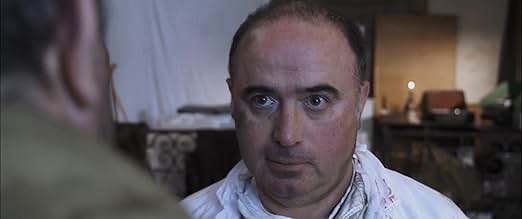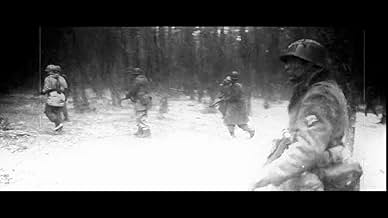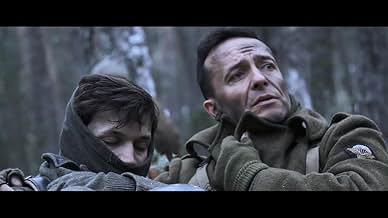Winter War
- 2017
- Tous publics
- 2h 20min
NOTE IMDb
3,9/10
326
MA NOTE
Ajouter une intrigue dans votre langueJanuary 1945. The first French regiment of paratroopers to fight with an American unit prepares to liberate Alsace in France during World War II.January 1945. The first French regiment of paratroopers to fight with an American unit prepares to liberate Alsace in France during World War II.January 1945. The first French regiment of paratroopers to fight with an American unit prepares to liberate Alsace in France during World War II.
- Réalisation
- Scénario
- Casting principal
- Récompenses
- 5 nominations au total
Tommy-Lee Baïk
- Melbarte
- (as Tommy Lee Baïk)
Natale Naccari
- Moretti
- (as Naccari Natale)
Avis à la une
The title of this movie in ROKU was Winter War. The title I needed to use to find it in IMDB was The Frozen Front. The title used in this review's window is Winter War. Then when it was published, The Frozen Front. Go figure.
I immediately recognized the format of this movie. It was French. French cinematography relies heavily on this monolog philosophical rant about the topic at hand. Each character will have their time in expressing their position on the topic, and usually its noir. It isn't something I like personally, but the French (France) love it. The Italians to a lesser degree.
And there are times when the plot justifies it for my enjoyment. There aren't too many American films that do this. However, one that come close to mind is Taxi Driver. To a much lesser degree, Mike Hammer detective stories.
What rubbed me the wrong way was the script's attempt to paint the harsh and deadly reality of war this French unit had to endure. It gave the impression that they were the only ones, and this was the ultimate hell on earth. To an individual in any theatre of war, it is true, however, the script spent way too much time on it, and it was too simplistic riddled with American cliches. Those of us who have knowledge of harsher conditions, we may begin to feel annoyed as the dialog carries on. One military unit that dealt successfully with hardships and death and were quite successful in WWII was the First Special Service Force. A combination of American and Canadian commandos.
Which leads me to think that maybe it was the translation form French to English. Often, a cliche in one language has no direct corresponding cliché in the other. I notice this quite often in Italian cinematography. When dealing with light humour, this isn't a big deal. When dealing with a serous plot/dialog, this may become torture. A cliche will summarize the emotions and ideas in few words for that language and culture. That is its strength and popularity. Another similar cliche in another language will not convey the same qualities, hence, the script dialog is broken, and the thought process limps and struggles resulting in very negative reviews from Anglophones and positive reviews for Francophones.
As an Anglophone and Italophone, I'm torn between a low rating or higher. I decided to give it three because it was presented in English and the more care should have been given in the English dubbing. But given that the script relied enormously on the style mentioned above, I can't see how it could have been done.
In closing.... it's a war movie focussed on the hardships a small group of men had to endure, both psychologically and physically, in the last days of WWII.
I immediately recognized the format of this movie. It was French. French cinematography relies heavily on this monolog philosophical rant about the topic at hand. Each character will have their time in expressing their position on the topic, and usually its noir. It isn't something I like personally, but the French (France) love it. The Italians to a lesser degree.
And there are times when the plot justifies it for my enjoyment. There aren't too many American films that do this. However, one that come close to mind is Taxi Driver. To a much lesser degree, Mike Hammer detective stories.
What rubbed me the wrong way was the script's attempt to paint the harsh and deadly reality of war this French unit had to endure. It gave the impression that they were the only ones, and this was the ultimate hell on earth. To an individual in any theatre of war, it is true, however, the script spent way too much time on it, and it was too simplistic riddled with American cliches. Those of us who have knowledge of harsher conditions, we may begin to feel annoyed as the dialog carries on. One military unit that dealt successfully with hardships and death and were quite successful in WWII was the First Special Service Force. A combination of American and Canadian commandos.
Which leads me to think that maybe it was the translation form French to English. Often, a cliche in one language has no direct corresponding cliché in the other. I notice this quite often in Italian cinematography. When dealing with light humour, this isn't a big deal. When dealing with a serous plot/dialog, this may become torture. A cliche will summarize the emotions and ideas in few words for that language and culture. That is its strength and popularity. Another similar cliche in another language will not convey the same qualities, hence, the script dialog is broken, and the thought process limps and struggles resulting in very negative reviews from Anglophones and positive reviews for Francophones.
As an Anglophone and Italophone, I'm torn between a low rating or higher. I decided to give it three because it was presented in English and the more care should have been given in the English dubbing. But given that the script relied enormously on the style mentioned above, I can't see how it could have been done.
In closing.... it's a war movie focussed on the hardships a small group of men had to endure, both psychologically and physically, in the last days of WWII.
With a storyline that owes more than a little to "The Big Red One" this is predictable and, to be honest, boring.
The direction is amateurish and the overuse of a single hand-held camera detracts from whatever is happening as well as giving the movie the feeling of being incredibly low budget.
The action/battle sequences suggest that the director had absolutely no idea of how men react in battle and (again the mini-budget?) there was no advisor to tell him, but (just to stress one point out of very many) it shouldn't take a genius to figure out that men tend to go for cover when someone is trying to kill them.
All in all a terrible movie which fails on every level and in which you don't even care about the protagonists.
(PS I saw the French Language version with subtitles, which often read as absolute gibberish!)
This is a WW2 film about disgruntled, weary soldiers from different nations in a frozen forest.
There is a lot of "smartness" to this. Some people won't like the disjointed dialog with pauses between lines, but that is how people spoke long ago. The constant "I interrupt the speaker cause I'm superior and he's inferior" dialog has been evolving in Western culture for the past 40 years.
But there was a time when being a brat wasn't praised the way that being a brat is praised today. And you thought the Nazis lost the war?
The only real drawback is how predictable the fate is for almost every character. It follows the Hollywood formula guideline of contriving bullets to only hit characters who are relatable, but never can find characters who are just hateful for no reason.
That, of course, has almost always been the Hollywood formula, although it wasn't preached as much until the mid sixties on into the eighties.
Very contrived, very predictable, but the dramatics are very good, and the characters do feel right for the times due to the constant pauses and lack of dialog among a tired group of soldiers.
There is a lot of "smartness" to this. Some people won't like the disjointed dialog with pauses between lines, but that is how people spoke long ago. The constant "I interrupt the speaker cause I'm superior and he's inferior" dialog has been evolving in Western culture for the past 40 years.
But there was a time when being a brat wasn't praised the way that being a brat is praised today. And you thought the Nazis lost the war?
The only real drawback is how predictable the fate is for almost every character. It follows the Hollywood formula guideline of contriving bullets to only hit characters who are relatable, but never can find characters who are just hateful for no reason.
That, of course, has almost always been the Hollywood formula, although it wasn't preached as much until the mid sixties on into the eighties.
Very contrived, very predictable, but the dramatics are very good, and the characters do feel right for the times due to the constant pauses and lack of dialog among a tired group of soldiers.
The dubbed-in English dialogue is so cliche-ridden, it's hard to believe that it was an accurate translation from the French. Can a screenwriter really be that bad in two different languages? Plus, the voiceover actors are so bad, it just calls further attention to the awful dialogue. On the plus side, the historically inaccurate large white parachute emblems on the front of many of the helmets--the ones that blared out to the Germans, "Shoot here! It's where my forehead is."--was a creative touch.
Ivan has nothing on this, historically accurate I paid 5 dollars to rent it on iTunes and enjoyed it
Meilleurs choix
Connectez-vous pour évaluer et suivre la liste de favoris afin de recevoir des recommandations personnalisées
- How long is The Frozen Front?Alimenté par Alexa
Détails
- Date de sortie
- Pays d’origine
- Langue
- Aussi connu sous le nom de
- The Frozen Front
- Voir plus de crédits d'entreprise sur IMDbPro
- Durée2 heures 20 minutes
- Couleur
- Rapport de forme
- 2.35 : 1
Contribuer à cette page
Suggérer une modification ou ajouter du contenu manquant

Lacune principale
By what name was Winter War (2017) officially released in Canada in English?
Répondre
























